
|
|
|
|
|
|
Jack Nichols: As you know, when we worked together in the Mattachine Society of Washington in the early 1960s, the idea of legalizing same-sex marriages was nowhere to be found in our strategies. Do you think this step would have naturally become part of the movement's current struggle if the Republican threat of a constitutional amendment hadn't materialized after the U.S. Supreme Court legalized private, consensual sodomy last June? Frank Kameny: You have the cart before the horse. The idea of same-sex marriages has been emerging in our movement, and gradually gaining momentum since Baker and McConnell in 1970. It really came to the fore about 1995 in Hawaii, and then Alaska, leading to the Congressional enactment of the infamous Defense of Marriage Act (DOMA), all along before the current Federal Marriage Amendment proposal, and reaching a temporary culmination in the Vermont Civil Unions legislation. It is the result of an organized response on our part, and on the part of the opposition as well, to increasing pressures from increasing numbers of individual same-sex couples both for formal governmental recognition of their relationships, and for formalized join adoption rights. The June 26, 2003 Supreme Court decision in Lawrence v. Texas merely added impetus to the hysteria of the opponents. We should not settle for "back of the bus" remedies such as civil unions and domestic partnerships, but should insist upon full civil marriage.
Frank Kameny: In late June, 1975, just before the July 3 announcement by the U.S. Civil Service Commission of its reversal of its ban on Federal civil service employment of gay people, I received a phone call from a fairly high government official who told me that "The government has decided to change its policies to suit you." Few citizens are ever told that directly. I have cherished the memory ever since. Being credited means less to me than the fact itself of the change these discriminatory policies, in civil service employment and in the issuance of security clearances. The one remaining undone job, from those days, is the military gay ban. That is being subjected to gradually intensifying questioning and challenge, and, it is to be hoped, will also be soon reversed. Jack Nichols: I recall how, when Ronald Reagan was elected, you told me that, and I quote, "the lunatic fringe has, unfortunately, come to a position of centrality." How do you feel now that George W. Bush is in the Oval Office?
Jack Nichols: Joan Tronto, professor of political science at Hunter, told the New York Times recently that gay marriages will make the movement more effective in the short run, but that it will make its goals more narrow in the long run. Others point out that marriage is, if not a dying institution, at least a very much weakened one that gays are, they say, lately "buying into." Katha Pollitt, writing in the December 15 issue of The Nation, says that to her marriage seems "a deeply unfair way of distributing social goods like health insurance and retirement checks, things everyone needs." If marriage were not used as such a means of distribution, would it still seem important to the cause of our equal rights? Frank Kameny: Much too much emphasis has been placed by our people (and others) upon the legal and material benefits of marriage to the exclusion or minimization of the emotional factors. All one needs to do is to view the scenes of the unalloyed joy on the part of the married or civil-unioned same-sex couples, to realize that marriage is still very much alive in our culture, and will continue to be centrally so, as a recognition and formalization of cherished and valued affectional relationships, quite independently of the incidental and less important "distribution of social good" carried along with it. Further, willy-nilly, as a matter of the political realities of the moment, achievement of full same-sex marriage has now become the criterion and the sine qua non for achievement of our full equal rights. Jack Nichols: Would you say that 2003 has been a stellar year in the history of the gay and lesbian movement? Why? Frank Kameny: Yes, absolutely. While it was visibly a long time in coming and the job is still far from complete, in this year we gays in America finally came into our own. The Lawrence decision not only finally lifted the stigma of criminality from us, but, as written, gave us as individuals, and our relationships, the imprimatur of a legitimacy and full human dignity never before afforded to us. Canada brought to our front door the possibility of same-sex marriage, and Massachusetts brought it "into the house." There was a growing proliferation of affirmative laws prohibiting anti-gay discrimination. Known homosexuality, which was a "kiss of death" for those in politics, has now become commonplace, no disadvantage, and, often, an affirmative advantage. Finally, gays are becoming not only merely visible, but routine, and popular in entertainment, such as the television series Queer as Folk and Queer Eye for the Straight Guy. Unquestionably there will be setbacks, but 2003 has clearly laid the groundwork for an even better 2004.
Jack Nichols: I recall how, 40 years ago in 1963, you and I marched representing the Mattachine Society of Washington in the great black civil rights march on Washington at which the Rev. Martin Luther King, Jr. gave his "I Have a Dream Speech". We were among the first, as I recall, to demonstrate our movement's willingness to cooperate with others-to gain civil rights for all. Now that Coretta Scott King, the Reverend Jesse Jackson and Representative Jesse Jackson, Jr. are speaking up on behalf of such cooperation and networking, what do you think? Frank Kameny: I've always believed in the value of alliances and mutual support between us in our efforts, and others in their efforts, as long as we remain centered upon our own issues, and so of course I'm delighted to see support coming our way from prominent figures in movements which, culturally and historically, have been accorded greater legitimacy than we have had, in order to help us achieve equal legitimacy in the future. Jack Nichols: Did you expect the U.S. Supreme Court to decide on our behalf, as it did, in the Lawrence v. Texas sodomy case? What were some of your immediate reactions to that decision? Frank Kameny: With a certain amount of unease, I fully expected that, at least with regard to the gays-only Texas law and those of other three states, we would prevail. I was less certain of our success more broadly. I hoped for more, but didn't really expect it. In fact, the Court gave us just about everything we could have asked for and much more. Upon learning the full scope of the decision, I was relieved and overjoyed that a process of attrition which I had calculated, statistically, would take until 2060, and which, as a personal project, had taken me over 30 years here in Washington, D.C. alone, was finally over and all the sodomy laws were gone, in a manner which validated our full, first-class status as citizens and human beings, as gay people in America had never before enjoyed. Jack Nichols: There have been a few statements in high places lately, minus the Bush White House, of course, indicating that there could be coming, after 10 years, possible change with regard to the military's 'Don't Ask, Don't Tell' policy. This struggle has also been the subject of your life-long efforts, as when the Mattachine Society of Washington conducted the very first protest at The Pentagon in the summer of 1965. Do you see these changes in the military's policies looming, perhaps, on the horizon? Frank Kameny: Of the major issues in which I have been involved over the past 42 years, gays in the military is the one which remains unresolved. I myself am still involved in two cases on this issue. While any effort to resolve the "Don't Ask, Don't Tell" policy and the exclusionary law behind it has met with a total stonewall for the past decade, there seems, finally, to be the beginning of progress. Lawrence gives us the possibility of overturning Article 125-Sodomy of the UCMJ, and several court cases are now challenging that Article. A small but increasing number of prestigious voices are being raised questioning the wisdom of the ban. There is also a small but real possibility of a reactivation of the draft. Given the declining stigma on homosexuality, if the gay ban remains in effect the likelihood of false claims of homosexuality to escape the draft will cause the draft to implode, collapse and fail. If necessary, I will initiate a publicity campaign urging people to falsely claim homosexuality in order to escape the draft until the gay ban is ended: it will destroy the draft or force rescission of the gay ban.
Frank Kameny: A number of archives, from the Library of Congress down, have requested my papers, and I haven't decided which one to write into my thus-far-unwritten will. In my will, I may simply appoint someone as the curator of my papers, and let the final decision be made posthumously. Some accountings of my work have been made, and, as the "walking history book" which I have become, much has been incorporated into various speeches over the past few years. But all of this is an area admittedly much overdue for attention. Jack Nichols: In Dr. David K. Johnson's new history, The Lavender Scare, there's a picture of you that was taken in 1986 with Washingtonians who were also members of the Mattachine Society of Washington in the 1960s. I was out of town when the 1986 picture was taken, but I'd like to ask you to say a few words about why the Society became the now-recognized vanguard of the movement. Frank Kameny: The 1986 picture was taken at my home at a celebration of the 25th anniversary of the founding of the Mattachine Society of Washington. At the time of the Society's founding, there were only 5 or 6 organizations in the national gay movement. Consistent with the times, they were bland, apologetic, defensive, and deferential to the "authorities" and the "experts". That was not my style or my personality; I insisted that we gays were the authorities and experts on ourselves and our homosexuality; that "Gay is Good"-a slogan which I coined in 1968, but the concept was there and governing from the outset. I saw that things needed to be done; that no one else was doing them; and so, with the organization behind me, proceeded to do them. And here we are. Jack Nichols: You have been one of my life's most important mentors and the period during which we worked together in the 1960s frames many of my memory's most treasured times. I want to thank you for that, and for the awareness you inspired in me when I was only 22. You may have some particular things you'd like to say either about matters today or about events in yesteryear. What are they?
|
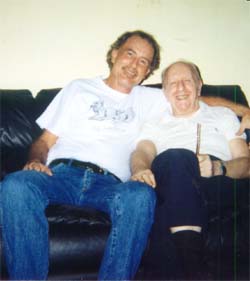 Frank Kameny in 1998 with Jack Nichols in Washington, D.C.
Frank Kameny in 1998 with Jack Nichols in Washington, D.C. 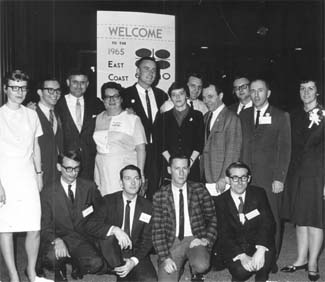 Frank Kameny, second from the right, among the movement's national leaders at the East Coast Homophile Organization's conference in 1965.
Jack Nichols is standing in the back row, center.
Frank Kameny, second from the right, among the movement's national leaders at the East Coast Homophile Organization's conference in 1965.
Jack Nichols is standing in the back row, center.
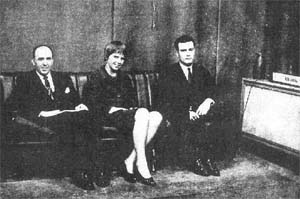 Frank Kameny in 1966 appears on TV with Mattachine Society of Washington members Lilli Vincenz and Jack Nichols
Frank Kameny in 1966 appears on TV with Mattachine Society of Washington members Lilli Vincenz and Jack Nichols
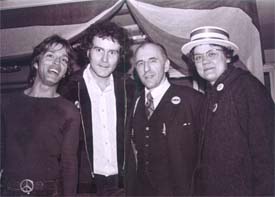 Frank Kameny in 1971 with Barbara Gittings, Lige Clarke and Jack Nichols
Frank Kameny in 1971 with Barbara Gittings, Lige Clarke and Jack Nichols 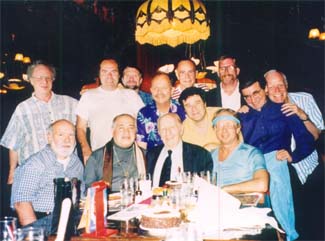 Frank Kameny's 75th birthday party is celebrated in Los Angeles
at a 1998 meeting of the movement's pre-1969 founders.
Frank Kameny's 75th birthday party is celebrated in Los Angeles
at a 1998 meeting of the movement's pre-1969 founders. 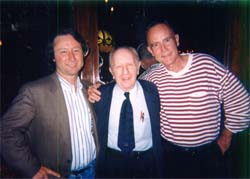 Frank Kameny with historian/scholar James T. Sears
and GayToday's editor, Jack Nichols
Frank Kameny with historian/scholar James T. Sears
and GayToday's editor, Jack Nichols